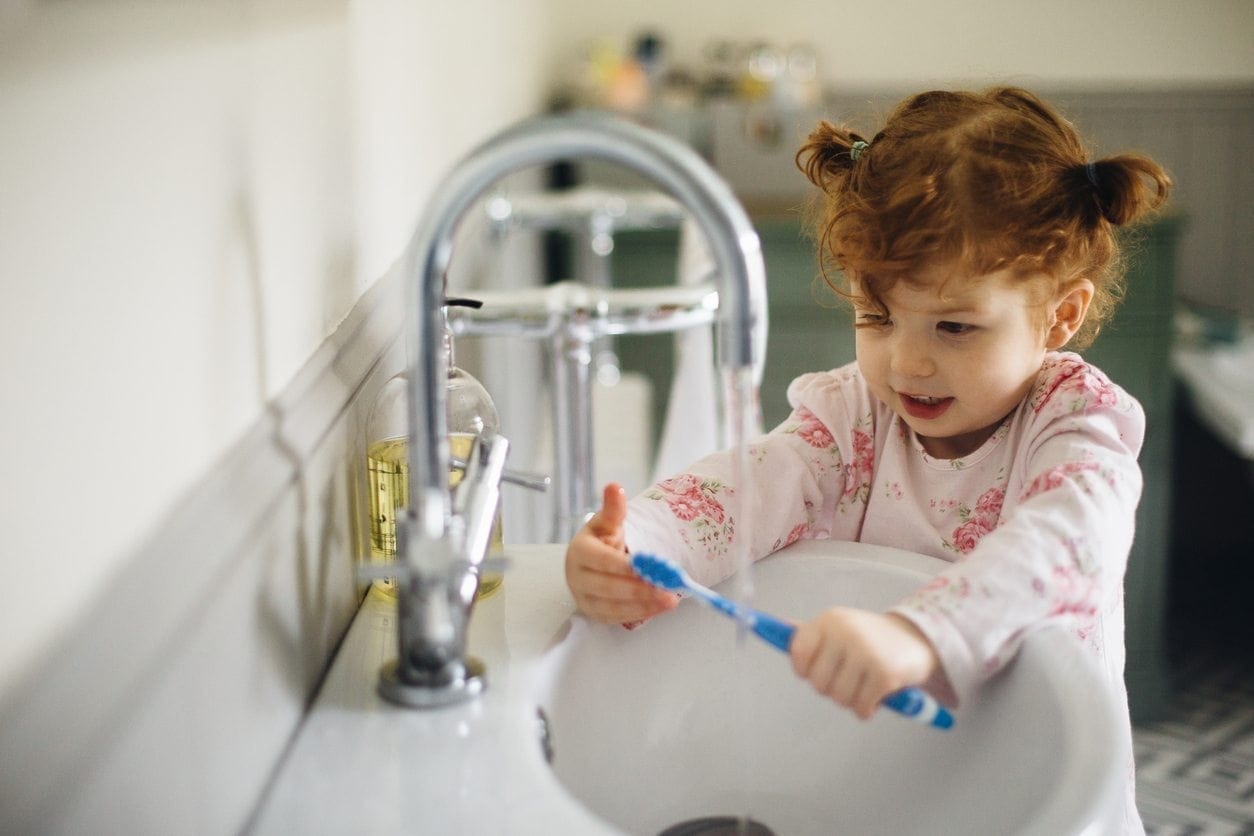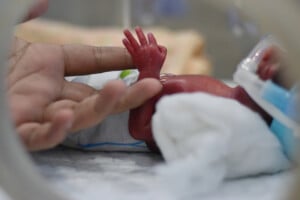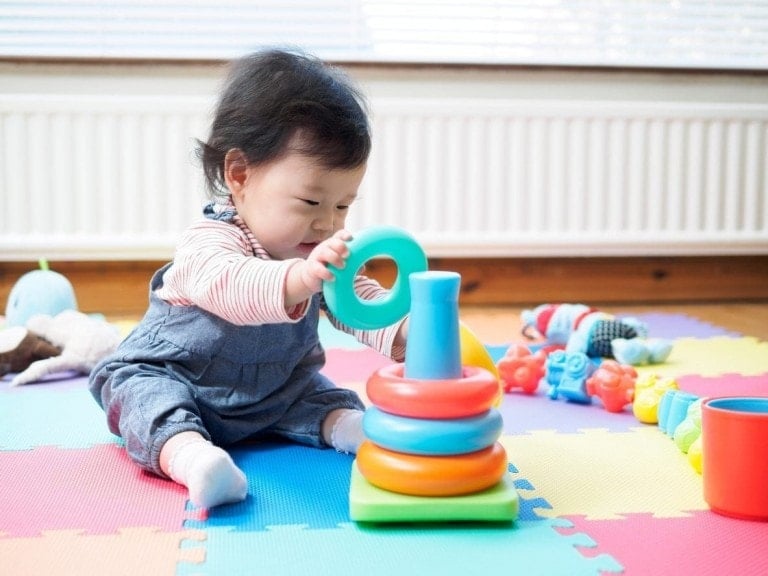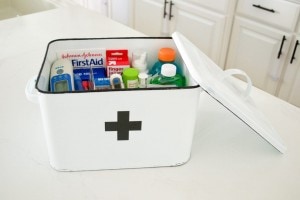Did you know your oral health can say a lot about your overall health? The same is true regarding our children’s mouths—just because they have baby teeth doesn’t mean they aren’t important! Most of us should plan to see a dentist twice a year or every six months (unless your dentist has advised otherwise)!
The American Academy of Pediatric Dentists recommends that we start taking our little ones to the dentist as soon as they turn one or within six months of their first baby tooth erupting (whichever one is sooner).1 Most of this visit is spent in conversation with the dentist. There are many important topics for us to talk about to make sure we start our baby’s oral health on the right foot and set them up for a lifetime free of any dental disease.
Dental visits at an early age also allow us to establish a dental home and help our tots become comfortable with their dentist. There are so many myths about baby teeth out there, though, so we thought we’d take a long, hard look at some of the most prevalent myths regarding kids’ teeth and oral care.
Kids’ Teeth Myths and Facts
Candy Is the Leading Cause of Tooth Decay
False! While candy can lead to cavity formation, it’s not the real culprit when it comes to tooth decay. The big, bad villain is acid, which is formed as a byproduct of bacteria-consuming sugar.3 The bacteria in our mouths consume all the foods we eat, but some foods are more cariogenic (more likely to cause cavities) than others.
When it comes to naturally containing sugar or added sugar, sugar is sugar! Some foods have higher sugar content than others, but most foods do have sugar in them. Many people don’t realize foods like rice or bread (really anything carbohydrate-based) can cause cavities. The higher the fiber content (found in foods like fresh fruit and raw vegetables), the less likely that food is to cause cavities.
One of the biggest causes of cavities is sugar-based drinks like juice, even natural and organic juices! When fruit is in juice form, it no longer contains fiber, which protects against cavities. Your child should have fresh fruit versus juice. So brush your kids’ teeth, and brush them well! And don’t forget to floss.
Baby Teeth Aren’t Important. They’re Just Going to Fall Out Anyway!
Not true! Before the tooth fairy sees all 20 of your little one’s baby teeth, they serve many important functions. Baby teeth act as natural space maintainers for permanent teeth. If a baby tooth is lost too early, it can lead to severe crowding within just a few years.
The health of your child’s baby teeth can have long-lasting effects. Tooth decay left untreated can cause pain, abscess, and swelling. An infection can even spread to other parts of the body and become life-threatening. Yikes! And while some baby teeth do fall out around age six, some also last until 12 or 13 years old, at which point there will be many permanent teeth in your child’s mouth. Healthy habits should start young!
Whitening Toothpaste and Similar Products Are Unsafe for Teens to Use
The American Academy of Pediatric Dentistry recommends using a conservative approach to tooth whitening in children in mixed and primary dentition.2 Once a teen has all their permanent teeth (usually by 12 or 13 years old), whitening should be done under the supervision of a doctor. Overuse of these products can cause the enamel to become fragile or porous.
Tooth sensitivity is one of the most common side effects. If this occurs, discontinue use immediately. Many people also don’t realize baby teeth are usually much whiter than permanent teeth; if your child has new permanent teeth that appear more yellow than the baby teeth, you most likely have nothing to worry about. This is normal due to the difference in thickness of enamel in baby teeth and permanent teeth.
Wisdom Teeth Serve No Purpose
If you have wisdom teeth, it doesn’t mean you are any wiser! Humans typically have three sets of molars. The first set typically erupts around age six, the second set around age 12, and the third set is the wisdom teeth, which may or may not erupt anywhere from late adolescence and on.
Sometimes people can be missing third molars, and since our wisdom teeth are unnecessary, I would argue that those people are smarter! But many years ago, wisdom did serve a purpose. Wisdom teeth used to be necessary when our ancestors had a very different diet consisting of uncooked foods and no utensils to cut them up. Now that our diets and lifestyles have changed, our bodies have adapted. Those wisdom teeth frequently don’t have the space they need in our jaws to grow naturally.
Knocked-Out Teeth Are Gone Forever
If your child loses a permanent tooth at home, we recommend finding the tooth and getting it back in the socket as soon as possible! The less time a tooth spends out of the mouth, the greater its chance of healing. Depending on your child’s age and stage of tooth development, the follow-up treatment may vary, but the key to success is how the missing tooth is stored and for how long.
We recommend gently rinsing the tooth with a saline solution and handling it carefully by the crown—try to avoid touching the root of the tooth. If possible, place the tooth back in its original socket at home. But if this seems like something you can’t handle, store it in a small container of milk and get to the dentist as fast as you can. Put pressure on the gums to reduce bleeding and pain en route to the dentist.
It’s good to know, right? Especially if your little goblins are particularly rambunctious! But just remember, baby teeth, on the other hand—once they’re out, they are gone for good—no re-implanting necessary!
You Should Brush Immediately After Every Meal
False! Believe it or not, this isn’t necessary. I always recommend that my patients brush first thing in the morning before they eat for two reasons. First, most people who brush after breakfast tend to forget because they rush out the door while eating, and then it’s too late to brush their teeth. Secondly, the acidic environment that ensues immediately after eating temporarily weakens the enamel of your teeth. If you brush while the pH of your mouth is lower, you can damage your enamel. But something you can always do after eating is rinse with water to help move any food particles off your teeth!
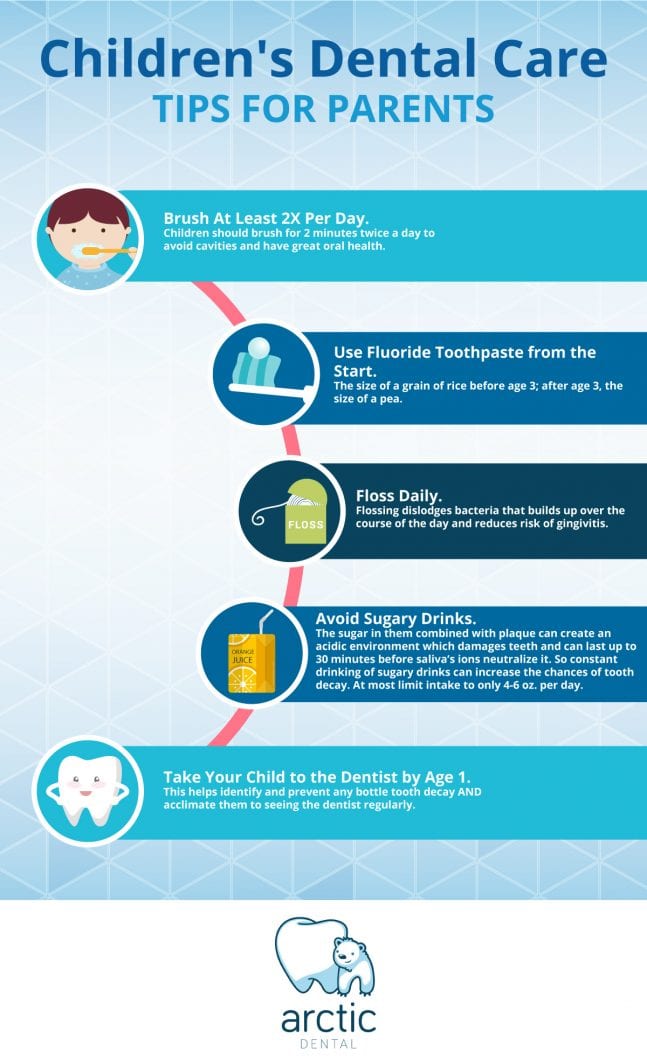
Don’t forget about your own teeth — especially after that midnight trip to the pantry to rifle through your secret stash of chocolate. Or maybe that’s just me?
